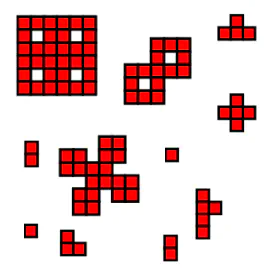Biological Evolution and Genetic Algorithms: Exploring the Space of Abstract Tile Self-Assembly
Christian Schroeder de Witt
July, 2012
Abstract
A physically-motivated genetic algorithm (GA) and full enumeration for a tile-based model of self-assembly (JaTAM) is implemented using a graphics processing unit (GPU). We observe performance gains with respect to state-of-the-art implementations on CPU of factor {{< math >}}{{< /math >}} for the GA and {{< math >}}{{< /math >}} for JaTAM. The correctness of our GA implementation is demonstrated using a test-bed fitness function, and our JaTAM implementation is verified by classifying a well-known search space {{< math >}}{{< /math >}} based on two tile types. The performance gains achieved allow for the classification of a larger search space {{< math >}}$S^{32}{3,8}S{2,8}S_{3,8}${{< /math >}}. We conclude that GPUs may play an important role in future studies of evolutionary dynamics.
Publication
In Master’s thesis (MPhys), University of Oxford - Awarded University of Oxford Tessella Prize for Innovation in Software

AI & Security Research | Strategy
AI and Security Research | Security Strategy
